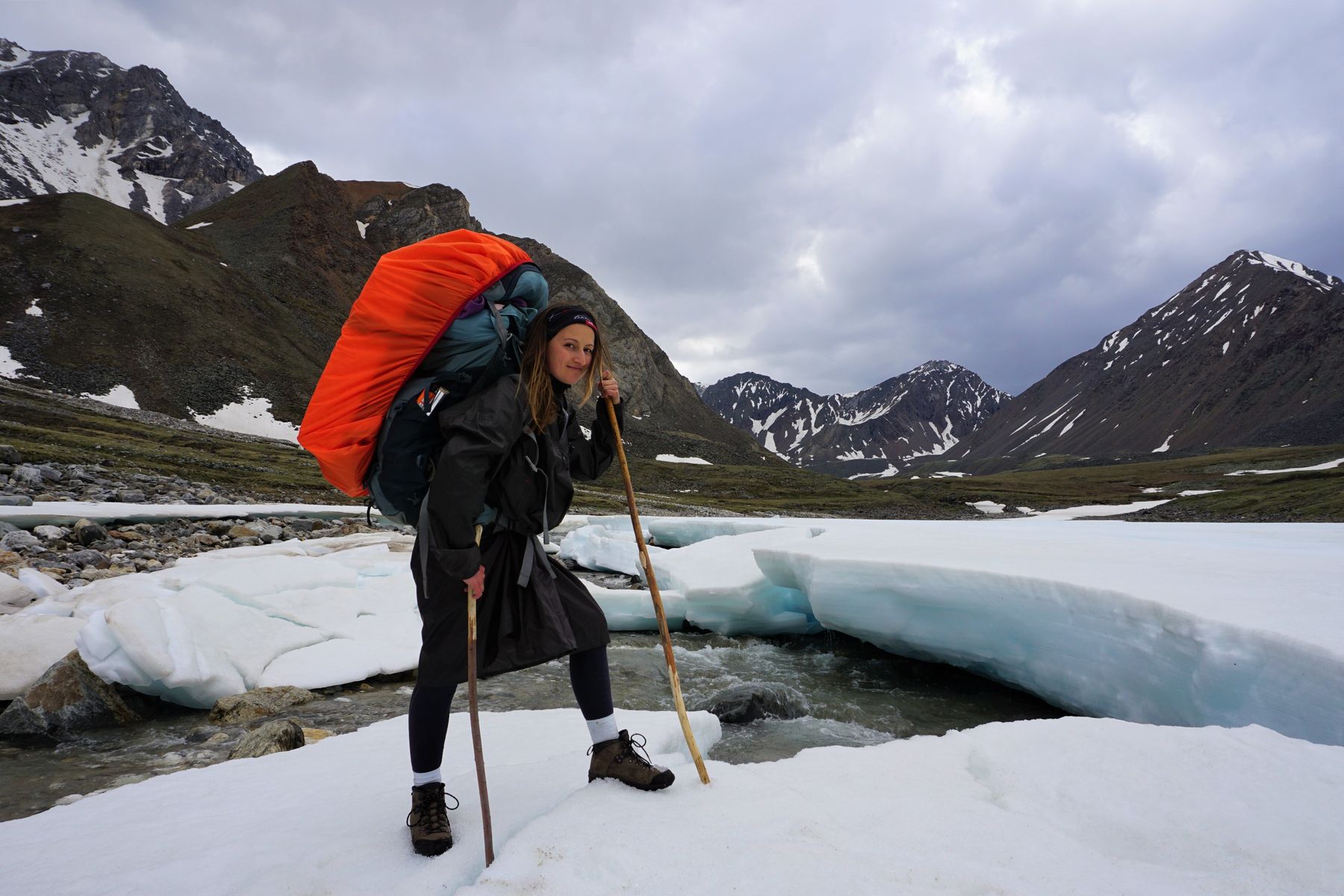Why Being a Dirtbag Might Be Important

We usually watch and have a discussion about one or two videos from the TROM Documentary in my English club here in Russia, but I was a bit tired between our big hikes to Shumak in the summertime, so I decided to screen the film, “180 Degrees South” rather than have a discussion :)
It’s a nice documentary about some adventure travelers (sailors/climbers/surfers; including the founders of Patagonia and North Face) with some focus on sustainability.
But of course, my meet ups can’t just end without some kind of intense discussion :D
There was one lady who argued that traveling and climbing mountains was nothing but “consumption” and that people don’t change or learn much through traveling around the world. Clearly, I had to disagree with her, since I traveled for 10 year of my life and I know that I would have been a completely different person today, had I never left New Jersey at age 18 (or Russia at age 8).
I don’t know how we would completely eliminate “consumption,” but I do know that traveling (real traveling- not vacation) forces you to minimize it. See my blog, “Saving Money and Yourself” to understand what I mean.
Also, it is important to make the distinction between traveling and vacation. To me, these are two polar opposites. I wrote about this topic towards the bottom of my blog on Maui.
As for my new rant :) … Why climbing mountains/ surfing/ being a “dirtbag” (Yvon Chouinard’s word) might be important :D
-A lot of environmental activists, Venus Project/TROM supporters, conservationists, etc. have a hard time because they find it upsetting that nobody seems to give a shit about the state of our planet, other species, our own species, pollution, global warming, poverty etc. etc. Crap like this-
How do you give a crap if you don’t see these things for yourself? Most don’t. Most people don’t give a crap I mean. The reason they don’t give a crap makes sense though; people don’t see such problems affecting them directly and immediately, and they don’t identify with whatever is being harmed directly.
“You only love what you identify with, and you protect only what you love,” Kris Tompkins, 180° South. It’s hard to identify with the ocean if you’ve never seen it and you don’t care to research much about it because you’re too busy making money or taking care of your kids. Why care about the 87,000 tons of plastic in the great pacific garbage patch? Or the fact that about 85% of the world’s fisheries may be exploited or depleted? Or the fact that 200,000 acres of forest are cleared each day and 9 million people die of hunger/malnutrition each year, while we throw away 50% of the food we produce. If it was your sister going hungry, you sure as hell would care, wouldn’t you?
It’s not anyone’s fault for not caring. Everyone is simply a product of their own upbringing and environment. But this is why traveling/hiking/climbing/kayaking/w.e might be important- because these activities force you to expand your environment. When you spend enough time in such incredible places on Earth (oceans, mountains, deserts, etc.), you start to form a bond with them, to identify with them, and then you start to care enough to want to protect them, the same way (and for the same reason) that you would want to protect your sister. Also, the more you expand your environment, the more you expand your capacity to take in more information- understand and perhaps identify with more of what’s out there.
Take this concept of “home,” for example. “Home” is a place that you identify with, it’s something that you love. I haven’t had one city or place to call “home” in 11 years, but the more I travel, the more I truly feel that the whole Earth is my home. I identify with the whole planet and all the creatures on it. I care about it, love it, and I want to protect it. So maybe that’s why I give a crap.
Note what I said before though- “it’s hard to identify with the ocean if you’ve never seen it and you don’t care to research much about it…” There are people, such as my friend Pablo, who have never left the country they were born in, but share this feeling of the entire Earth being their “home.” Pablo gained this perspective through feeding his curiosity- through research, reading books about the way the world works, watching documentaries, etc. This is exploring the world in a different, but perhaps more important manner.
So traveling is only one way to expand your environment and form a meaningful connection with the Earth, learning about the world is another way. Combine the two and life couldn’t be more thrilling! :)
I had a conversation with Tio about this recently:
Tio: “perhaps there are 2 kinds of exploring the world: “feeling” it and thinking about it. Though I would say we rarely “feel” the world, we mostly “think it.” Like, to me, the most fascinating things about our world are the things you don’t get to see or experience in any way: far away galaxies, atoms and quarks, gravity and other “forces,” the way light works, and so forth. The more you know about these, the more fascinating and unreal it will seem to you. I like mountains and whales :), but I feel a deep fascination about understanding these more than “feeling” them, like seeing them. For instance, to know that they discovered a cluster of bones in blue whales that prove they were a land animal a few million years ago is just fascinating. Perhaps the best is to combine the two worlds where possible – like know a great deal about say whales and also see whales. The night sky is a scenery that we all have access to in pretty much the same way, but only a few enjoy looking up and understand the amazingness of what they are seeing. The moon is a completely different thing the more you learn about it. It is not “the moon” anymore, but a massive rock that dances with the earth because space is bent (gravity) and they fall towards each other and sometimes push themselves apart. Fascinating.”
Me: “I completely agree about “feeling” and “thinking” it. I think schools (and the system in general) kill curiosity, making most “normal” people not care to think much of anything about anything. But it is spectacular when you go out into the mountains, and you think about the movement of the Earth, the forces that pushed those peaks to be where they are, and to be continuously changing. Combine the two as you said- thinking and feeling. When you think about the molecules that make up the rain, snow or hail- and feel them hit your face :D How spectacular it is to think about these building blocks- that everything, including us, is made out of the same lego pieces :). And that all of these lego pieces are mostly just empty space (the distance between a nucleus and an electron is enormous). How can you not feel a connection with the universe, “thinking” all of this? Or “feeling” this when you, say, move across a vast ocean in a little sailboat, having nothing but the elements push you forward.
Or when you stare at a fire under that big rock, knowing that the domestication of fire was the first phenomenon that caused humans to become who we are today. Over 300,000 years ago- before homo sapiens were even a species!- other species of humans learned to use fire for light, warmth, cooked food, and as a deadly weapon. Fire allowed humans to have power beyond the size, strength, or capacity of their physical bodies. This was a sacred tool, transported north and out of Africa in an amadou mushroom, then far across the globe. Fascinating”
I love talking to Tio :) I’m always distracting him from all the hard work he’s doing :D He’s just published parts 2 and 3 of his newest book by the way! Check it out here.
After talking to Tio, I thought that perhaps that lady who came to my meet up had a point. Maybe a lot of people travel just to “feel” it- just to see mountains, surf, etc. and maybe that’s not enough to make any positive change. I mean, in order to want to protect or defend something, you have to first learn about what that thing is, and what’s harming it. Otherwise the most you can do is comment about how pretty or ugly it is.
So curiosity is key. Be curious! Learn about the world! That’s quite easy to do with the internet nowadays. As I mentioned to Tio, the system (schools, jobs, consumer-based culture, etc.) kills our curiosity. -It influences us to care about nonsensical bullshit like celebrities and smartphones more than, say, science and the well-being of our planet. But being a dirtbag makes you not care about the system :) (schools, jobs, consumer-based culture, celebrities and smartphones) because the only thing dirtbags really care about are mountains, rocks, waves and oceans :) So if you get that dirtbag to be curious about the world and have him/her feed this curiosity, I promise that you will get a whole bunch of people that actually give a crap :).
The downside is that these dirtbags (like me) are almost always broke :D so maybe they don’t have much power to change the world.
Or do they? :).
P.S. Check out this one:
